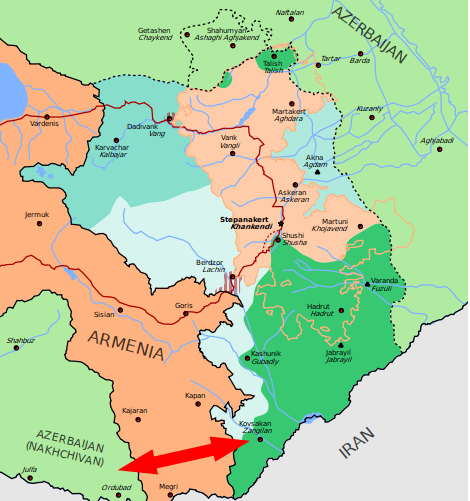A peace treaty is almost ready, yet the sides remain divided on a single issue: Baku wants an unpoliced land bridge across southern Armenia, while Yerevan insists that any road or rail line on its territory must remain under Armenian jurisdiction.
Addressing the 3rd Shusha Global Media Forum on 19 July, President Ilham Aliyev repeated two pre-conditions for signing the agreement—amending Armenia’s constitution and formally disbanding the OSCE Minsk Group—then added a blunt warning: if Armenia keeps blocking the so-called Zangezur Corridor, it will “lose its chance to become a transit country.” He underlined that Azerbaijani cargoes must cross the Syunik region “without meeting Armenian border or customs officers”. He noted that Azerbaijan’s rail link to the frontier is expected to be completed by next spring.
Yerevan Pushes Back
Two days later, Prime Minister Nikol Pashinyan’s spokesperson, Nazeli Baghdasaryan, rejected Aliyev’s language as “an implicit territorial claim.” Yerevan’s counter-proposal, branded the “Crossroads of Peace,” offers to open every regional route—but only if Armenia can apply standard passport checks, customs seals, and transit fees. Anything less, Baghdasaryan argued, would invite smuggling and erode Armenian sovereignty.
Washington Floats an Unorthodox Fix
U.S. diplomats have quietly suggested leasing the corridor to a neutral operator for a 100-year term. President Donald Trump told Republican senators on Friday that his administration’s diplomacy has brought the rivals “within a whisker” of a breakthrough. However, neither capital has publicly embraced the leasing idea.
Infrastructure: Almost There, Yet Nowhere
• Azerbaijan has nearly completed a rail line from Horadiz to the Armenian border and paved new highways toward Iran.
• Armenia says it will lay only 42 km of new track in Syunik, and only after a legal accord is in hand; preliminary roadwork near Nrnadzor is underway.
Sticking Points Beyond the Corridor
Baku insists that Armenia’s constitution still implies territorial claims, while Yerevan’s Constitutional Court ruled last September that no such wording exists. Pashinyan has offered to change the text only if the court later finds a clash with the signed treaty, keeping the matter an internal Armenian debate and not a negotiating chip.
Diplomats say roughly 95 percent of the peace text is complete. If the corridor question remains unresolved, Armenia risks economic isolation, and Azerbaijan could end up with a costly, dead-end railway. Summer has become an informal deadline: both leaders want at least an initialed document before autumn politics at home grow louder. For now, one narrow strip of mountain road still stands between the South Caucasus and its long-promised era of open borders.
Map: Wikimedia Commons
